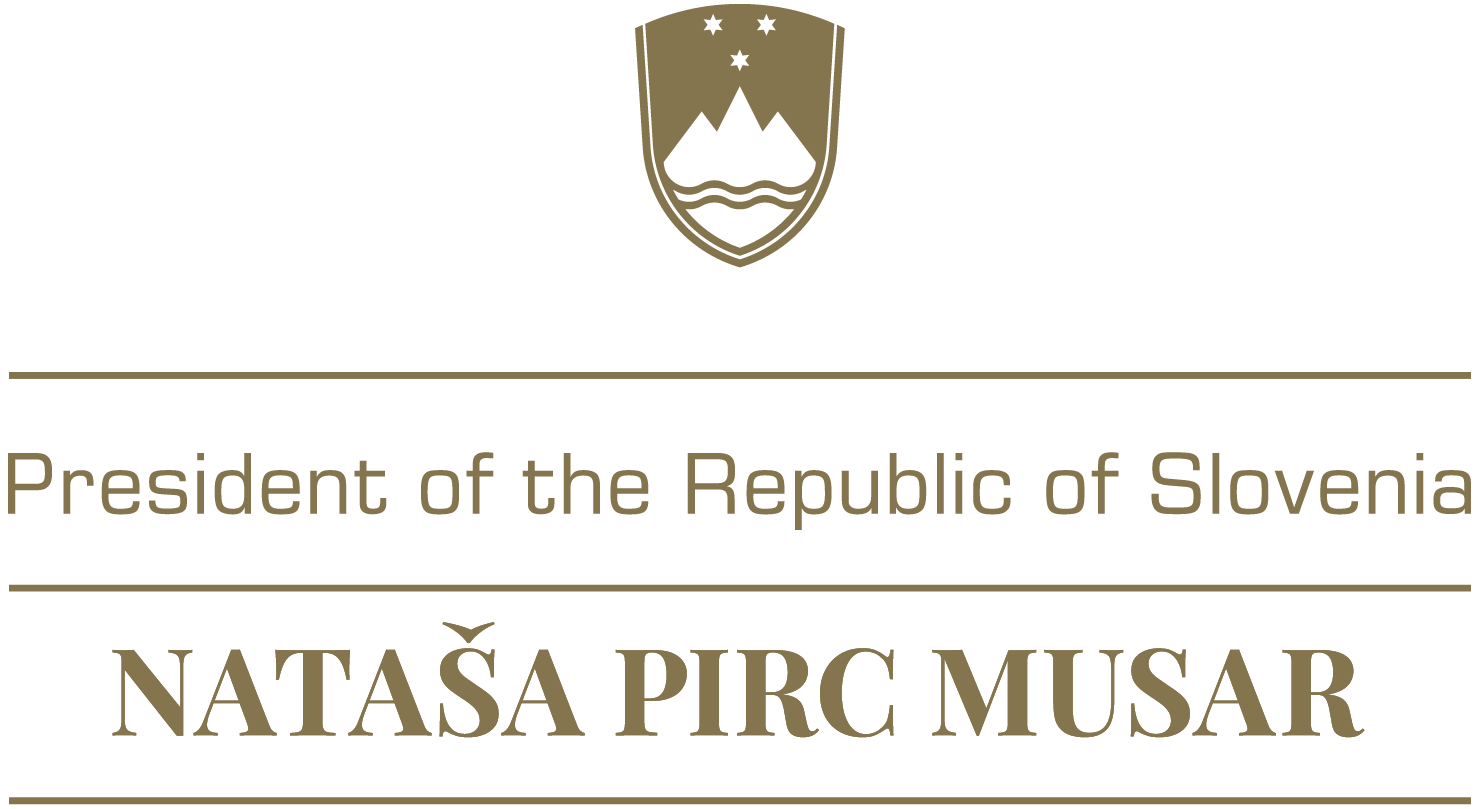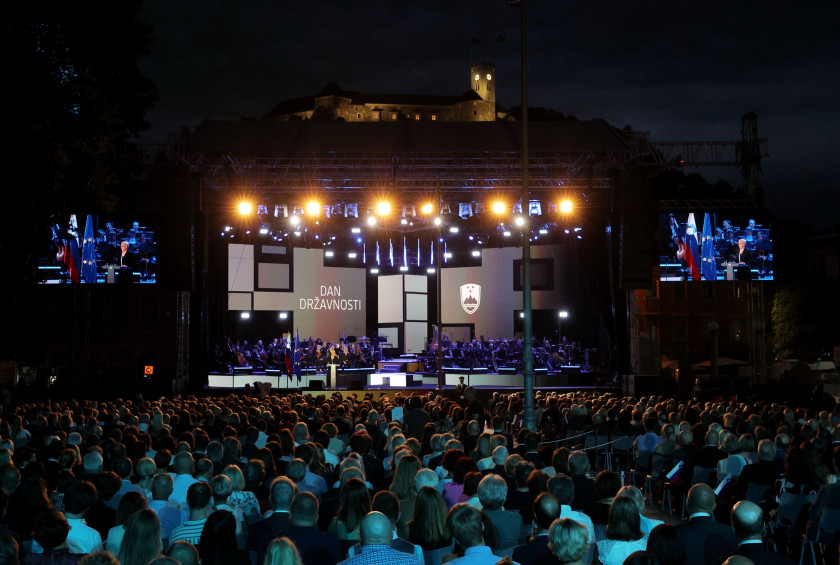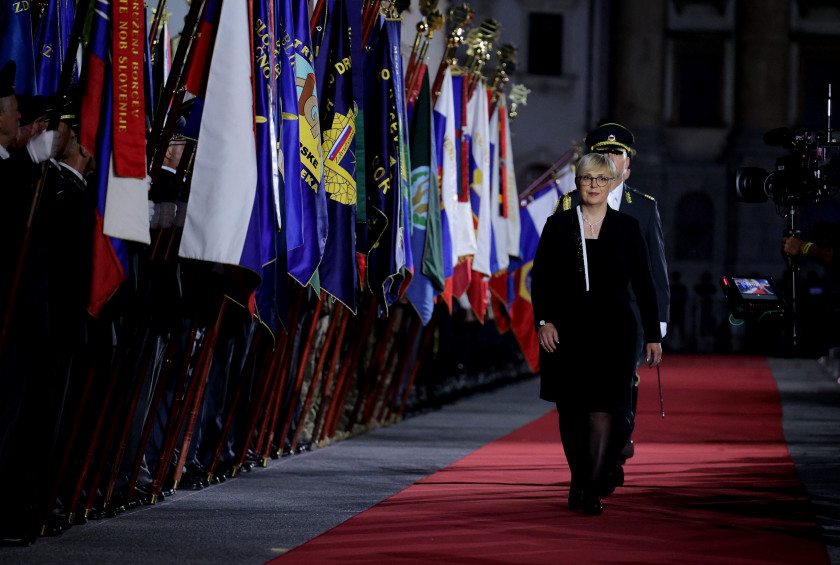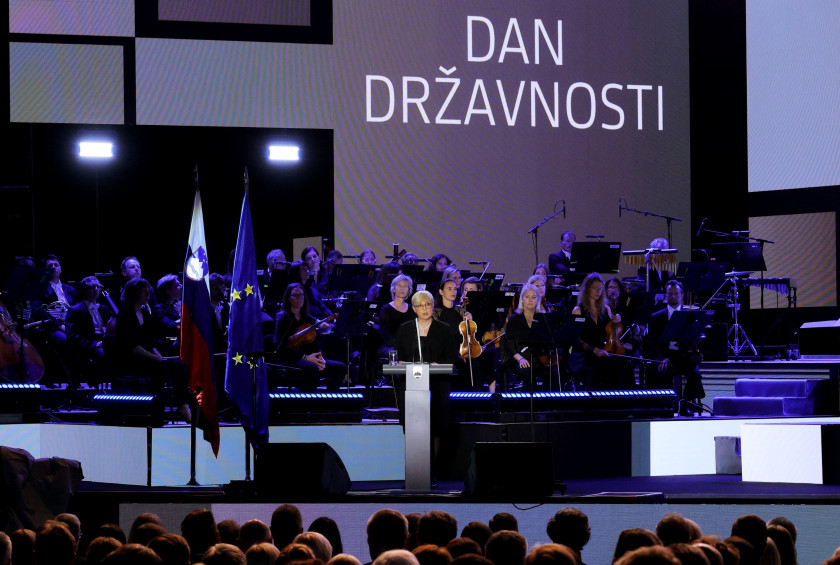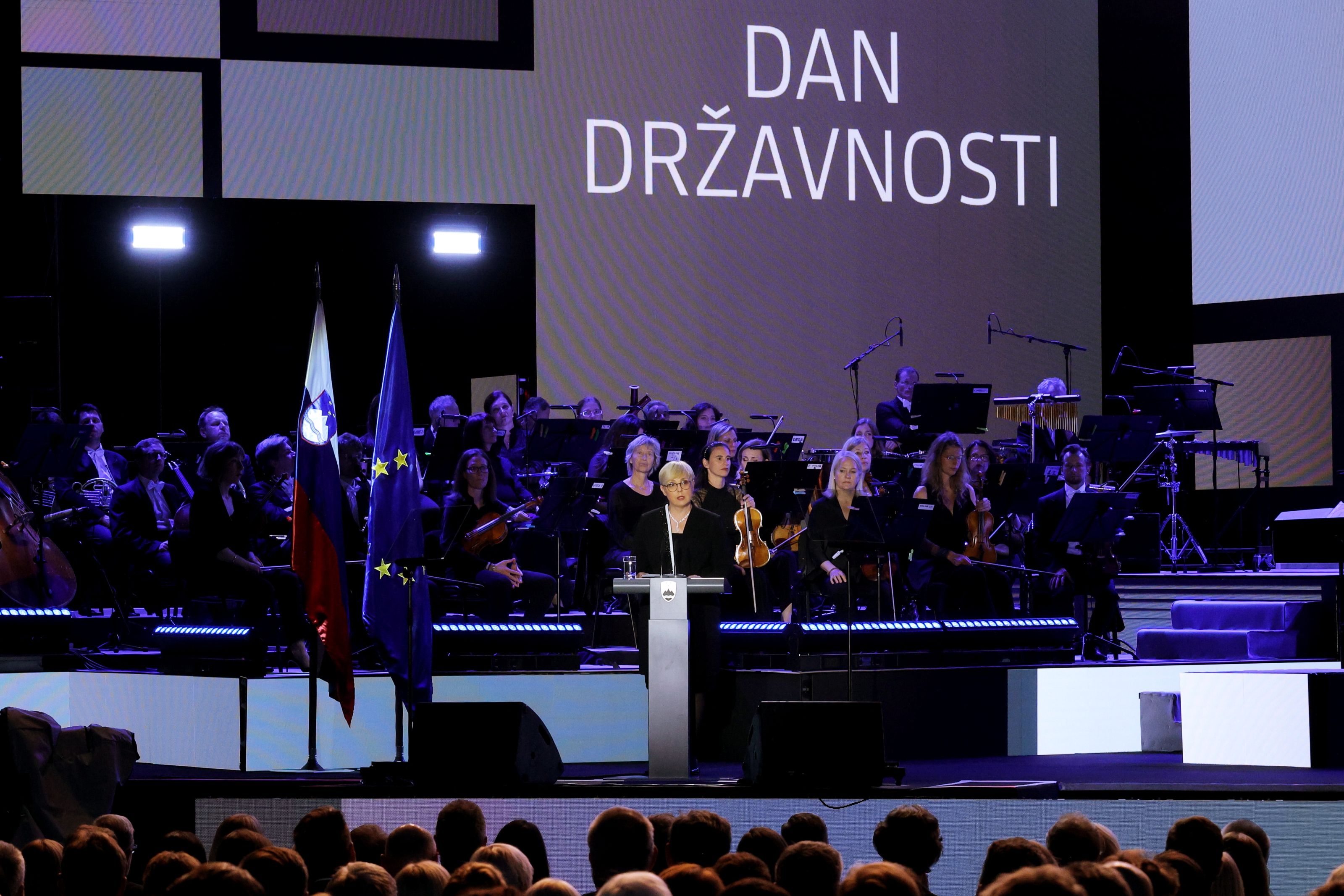
Photo: Daniel Novakovič/STA
Address by the President of the Republic of Slovenia Nataša Pirc Musar at the State Ceremony on the occasion of the Statehood Day
The President of the Republic of Slovenia, Nataša Pirc Musar attended the central national ceremony of Statehood Day. The President of the Republic of Slovenia was the keynote speaker at the ceremony.
Kongresni trg, Ljubljana, 24 Jun 2024
Dear Slovenians, citizens and residents of the Republic of Slovenia, ladies and gentlemen,
It has been almost 40 years since the "Slovenia, my land" video first aired on our television screens. The one-and-a-half-minute video highlights the beauty of Slovenia and introduces its people, who proudly represent a land that is now an independent country.
Times have not been easy on Slovenia, but we always saw the bright light at the end of the tunnel. Today we live in freedom, but dark clouds are gathering on the horizon. The future appears anything but bright. There is a shadow of doubt creeping around the durability of what we as a nation have achieved.
Slovenia, its natural environment, its people and its pride can only last forever if the love for our homeland is shared and continues being passed down from generation to generation. This is possible only if we do not doubt in the foundations that define and build Slovenia. Therefore, we cannot doubt whether we are a community. Whether we strive for solidarity. Whether we respect the natural world around us, and last but not least, whether we are confident in our greatness despite our country’s small size.
We have to prove every single day that we are a community. We have to know how to face challenges that tarnish Slovenia's image. For instance, poverty. According to the Statistical Office of the Republic of Slovenia, approximately 264,000 people – 13,000 more than in 2022 – lived on an income below the poverty risk threshold in 2023. Around 287,000 people – 11,000 more than the year before – were at risk of social exclusion.
It is said that we inspire and gain followers through example, and sometimes, when the government does not know how to improve our society’s unacceptable image, it seeks inspiration to fulfil its duties beyond the confines of its offices. Let's look at some numbers again: 33 million euros was raised for 13,000 children living in poverty and other difficult situations. These funds were donated by 10,000 individuals and institutions. This is an achievement of just one of several projects in Slovenia, namely the aid programme for disadvantaged young people called "Botrstvo". These numbers prove that we know how to be a community. We should not hide this; we should not be humble and modest when we have good reasons to be proud.
This is why, last month, Ms Anita Ogulin received the Golden Order of Merit of the Republic of Slovenia. Not just as Anita. Not just as a crucial part of the "Botrstvo" programme in Slovenia, but also as a symbol of everything that she and several other organisations and programmes accomplish on a daily basis to improve the lives of the poor, helpless, excluded, and marginalized in Slovenia. Their message is concise: without empathy for others, there is no community.
A community can only thrive and endure if we truly believe in it and can always rely on every aspect of it, both its public and private components.
Of course, it is perfectly reasonable for doctors, judges, employees of administrative units, teachers and others, who face difficulties in their workplace, to want better working conditions and adequate remuneration for their work. But they are not the only ones. The private sector faces similar difficulties. We understand the theories of those who claim that living in Slovenia would be more affordable if the taxes were lower. But we need to focus on the bigger picture. And it is not just black and white.
What the public and private sector have in common is that they both owe their country. That they owe our community. And this community has done a lot to improve our lives. Let's take a moment to reflect on ourselves and take a good look around us: Who among us paid high tuition fees to attend school or university in Slovenia? It is true that there are long waiting times for many medical procedures. Too long sometimes. But do we need to get loans in order to afford them? No, because we pay taxes.
The vision for developing our community must accordingly consider the needs of everyone. We must ensure that the public sector does not turn into one big market product. We need to understand that the power of the community can only be strengthened by understanding the needs of the private sector, while also recognizing that taxes serve a necessary purpose.
I see and hear this mentality in my interactions with businesspeople. This is why it is important that the government engages not only with the public sector, but also with businesspeople to find solutions that will help our economy, and consequently our community, develop. That we can preserve the essential elements of Slovenia that we, the older generation, grew up with, thanks to the efforts of our predecessors. So that today’s young people and future generations can experience that Slovenia.
But this is not enough. In terms of Slovenia's development in the broader international community, it is only right that we be honest with ourselves: there is not enough room on this planet for all our wishes. All of us need to learn how to live better with less, starting with everyday tasks.
Giving back to the community is crucial, and the heaviest burden falls on the wealthiest citizens, not just in terms of income but also in terms of property. There is already a widespread belief among them that they should be taxed progressively in order to achieve high-quality social development as a whole. A group of 200 millionaires has sent a message to the World Economic Forum in Davos, advocating for fairer taxation of the wealthy, claiming it to be the right step for the future.
Sacrificing a portion of one's wealth for society’s greater good is not a communist ideology, as some might claim, but rather an investment in excellence and security. An advanced and a secure society is one that chooses to eradicate poverty, invests in science, education and culture, provides accessible healthcare for all and develops an environment where creativity and entrepreneurship can thrive. It is a society that ensures no one is underprivileged, marginalised or excluded.
The vision for the future of human society is not individualism, doing less for the common good and doing more for oneself. On the contrary. It is being part of the community and striving to make it stronger. Common problems cannot be effectively resolved unless we all work together. When the community is well, everyone within it is well too. If we all have access to excellent public services, we need not worry about being able to afford them when we need them most. This is the key element of freedom and the foundation of a strong community.
A strong community is also able to define its attitude toward history,
and Slovenian history has so many amazing chapters. This year, for instance, the National and University Library is celebrating its 250th anniversary. For its dedicated work, which began with the books saved from the flames of fire, the library was rightly awarded the Order of Merit for Distinguished Service of the Republic of Slovenia. Despite this and other similarly beautiful stories in our over a thousand years of history, Slovenia still finds itself in a challenging position, grappling with events from its past. And we have to find a way out of this situation.
Let's all return for a moment to the beginning of the evening. There is deep symbolism in standing together as one under the raised Slovenian flag, accompanied by the sounds of our national anthem, "Zdravljica”. We stand because we know how fiercely our ancestors fought in the Second World War and how determinedly we fought for our independence during the Ten-Day War. We stand together for the national anthem because it is ours, even though we know that the story behind the struggle for independence is far from pretty. Even though we know that mistakes were made, and terrible ones at that.
The extraordinary partisan battles against the occupying forces and their collaborators was overshadowed by the tragic post-war extrajudicial killings. Last year, in this very place, I called for reconciliation. For true reconciliation, which includes a personal connection, the right of law and freedom. A reconciliation that will allow us to accept history as it is, without any burdens. It should not and cannot be taught selectively. We need to develop a critical distance from it, from kindergarten onwards, so that we are able to understand everything that has happened in the past. That is why I would like to stress, and stress loudly:
it is time.
On the 80th anniversary of the end of the Second World War, it is time to give a proper burial to all the Slovenians and everyone else who has not yet been afforded the right to a resting place. Let's put an end to the editing of history to suit current political interests! This is not part of a proper burial. It is time for empathy and time to internalise the fact that the rights to a personal life, to the rule of law and to a life in a free country are integral parts of any real conciliation. I therefore ask on behalf of all people of good will: let us not hesitate. Let us not allow the remains of the victims of post-war killings to be kept in basements and plastic crates. Because this is simply not humane. Because this is not us.
It is time, dear Slovenia.
Ladies and gentlemen,
We have proved time and again that the citizens and residents of Slovenia are quick to show solidarity. Most recently in the devastating floods last summer. However, solidarity is not only one-time actions. How many times have we heard how people affected by natural and other disasters are grateful for the help provided in their time of need and for the attention granted by the media, but they are nonetheless aware that this help is temporary. What they really need is the removal of obstacles on their path to the life they want to create for themselves.
As a result, we must talk not only about the acts of solidarity, but also about the vision of solidarity. Active help for people in need, inclusion and acceptance, these are all processes and policies that must be part of such vision, as they enrich society and better prepare it for the future.
Of course, the vision of solidarity is much more. It also includes intergenerational solidarity. Senior citizens in Slovenia must not feel lonely or excluded if we are to be a country of solidarity. The vision of solidarity also encompasses the redress of injustices caused by ill-conceived policies, which result in individuals or entire groups being subjected to various stigmas and thus finding themselves on the margins of our community. To sum up, the vision of solidarity means that no person in Slovenia must be seen as a burden on society. Everyone can and must be allowed to contribute to our common development.
Ladies and gentlemen,
we cannot imagine community development without a clean and healthy environment. This is our right provided by the Constitution. The President's forum to be held in autumn will be dedicated to the fulfilment of this right. At the forum, we will discuss the green transition for everyone, including the weakest and most vulnerable.
We must take the green transition seriously. We must support all visions that aim to change our ingrained habits – from our mobility, which must become sustainable, to industrial processes, eating habits and energy production and consumption. Let's support those visions that aim to provide the greatest share of renewable energy sources. This is the right step towards a climate neutral and resilient, and consequently secure society. The scenarios for our future energy sources must also include nuclear energy. We already have the necessary knowledge and experience with it. Nevertheless, we must make decisions on any investment, in particular investments in big projects, prudently and responsibly.
The construction of a nuclear plant is a very big project.
It is so expensive that it would exceed Slovenia's annual budget. As it is expected that the government would support the power plant’s financing, this would significantly affect its capacity for financing other projects. Seeing such a project through would be felt by each and every one of us.
Constructing and financing a nuclear power plant is far from a mere technical issue on which the general public can hardly decide, as we sometimes hear. It is a very real, life issue, and we have the right to a fair assessment of whether we can even afford such a power plant.
The consultative referendum to be held in the autumn should only give us the answer on whether the Slovenian society agrees upon continuing to have nuclear energy in the future. We should not understand it as a green light for an investment in a new nuclear power plant, but only as a step on the way to laying an appropriate and transparent groundwork for the public to be able to decide on the investment in the second, decisive referendum.
The proposal to hold the second referendum is therefore not unreasonable. It is difficult to understand why politicians are so afraid of it. Why do they put so little trust in the public, even though the public bears the burden of politicians’ both good and bad decisions? These are two important questions to which we should find answers before the autumn referendum.
Finally, a few words on confidence.
Ladies and gentlemen, we are still not sufficiently aware of how quickly our country has become a state that actively participates in shaping the international community.
Slovenia had not even been a member of the United Nations 10 years when in 1998 it was already entrusted with a seat among the non-permanent members of the UN Security Council. In the process of accession to transatlantic integrations, Slovenia was a role model for all new democracies in Europe. It has been a member of the EU and NATO for two decades, actively co-shaping the European future and our security. Slovenia is still the only country in the Southeastern Europe that is a member of the Organisation for Economic Co-operation and Development (OECD). In terms of GDP per capita, it is among the richest 10% of the world’s population. Once again it is a member of the UN Security Council, elected with the great majority of UN member states. This makes its responsibility in international relations so much greater.
Confidence in international relations is particularly important when values are at stake: consistency, principled action, respect for international law, including respect for human rights and fundamental freedoms for all. Our power does not lie in weapons nor in financial influence. We draw it from our values. This is the power of words, which gives us confidence to speak up when situation so demands.
We were loud when the Russian Federation carried out its aggression against Ukraine. And rightly so. This amounted to trampling upon the foundations of international order.
We were loud when Hamas killed Israeli civilians. And rightly so. Terrorism is a cancer on modern society, against which we must act decisively and eradicate the reasons for its rise.
We were loud when Israel started killing Palestinian civilians. And rightly so. The Palestinian people are being collectively punished for the attack of a terrorist organisation. Today, counting more than 37,000 dead, they live in ruins, poverty, and hunger, without the possibility of education, without basic healthcare, and constantly in fear for their lives.
We were loud when the International Criminal Court and procedures involving the issuing of arrest warrants, also for heads of state, had to be protected. And rightly so. A crime is a crime. Suspected genocidal conduct is suspected genocidal conduct, regardless of circumstances.
When human rights and dignity are at stake, we must never be silent.
Ladies and gentlemen,
Let me return to our national anthem. It is the most beautiful in the world. Not only because it is ours, but also because it is cosmopolitan. With it, we celebrate our nation, but also the world in which we live. "God's blessing on all nations," says Prešeren, adding, "no more shall foes, but neighbours be". This is the spirit of the United Nations Charter – coexistence and collaboration, not war and weapons. This is the spirit of united Europe to which we aspire and in which we want to live. It encompasses the essence of our patriotism and efforts for prosperity. Prosperity for all. Dignity for all.
There are dark clouds on the horizon. A storm is coming, the worst since the Second World War. We have to be ready for it like never before. But we can only overcome it together.
We must start with ourselves, at home. We must become strong and firm, so as not to be afraid to face all the problems troubling us. We must become a real, inclusive community that believes in solidarity, that values and respects nature and the environment in which it develops, and is determined to confidently enforce and advocate its interests and the values enshrined in its Constitution. Such a Slovenia will be respected at home and abroad. Such a Slovenia will never be on the wrong side of history.
Thank you all, and sincere congratulations on the occasion of Statehood Day.
